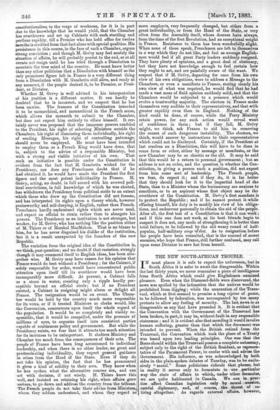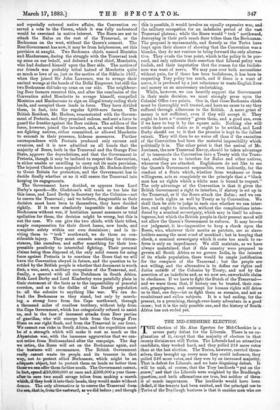THE NEW SOUTH-AFRICAN TROUBLE. '
TN most places it is safe to expect the unforeseen, but in South Africa it is safer to await the disagreeable. Within the last thirty years, we never remember a piece of intelligence from South Africa which could give Englishmen unmixed pleasure. Even when the Diamond-fields were discovered, the news was spoiled by the intimation that the natives would be prohibited from digging ; while the annexation of the Trans- vaal, which at first seemed to promise a long regime of peace, to be followed by federation, was accompanied by too many protests to allow any feeling of security. The last news is as disagreeable as any that have preceded it. It is evident that the Convention with the Government of the Transvaal has been broken, in part, it may be, without fault in any responsible statesman ; and it is evident also that mending it would involve human suffering, greater than that which the document was intended to prevent. When the British retired from the Transvaal, the Convention which took the place of a Treaty was based upon two leading principles. One was that the Boers should within the Transvaal possess a complete autonomy, subject only to the right of the British Resident, as represen- tative of the Paramount Power, to confer with and advise the Government. His influence, as was acknowledged by both sides in the plain-spoken debates of Tuesday, was to be exclu- sively "moral." Some politicians ridicule that phrase, but in reality it serves only to formulate in one particular way the state of affairs to which, under other formulas, we are quite habituated in Canada. We can in prac- tice affect Canadian legislation only by moral .suasion, careful diplomacy, and, of course, the threat of re- tiring altogether. As regards external affairs, however,
and especially external native affairs, the Convention re- served a veto to the Crown, which it was fully understood would be exercised in native interest. The Boers are not to attack the Zulus on the east of the Transvaal, or the Bechuanas on the west, without the Queen's consent. The Boer Government has now, it may be from helplessness, set this provision at naught. Two Bechuana chiefs, named Montsioa and Mankaroane, during the struggle with the Transvaal took up arms on or behalf, and defeated a rival chief, Moschette, who had declared himself upon the Boer side. The motive of our friends was probably tribal hatred of Moschette quite as much as love of us, just as the motive of the Sikhs in 1857, when they joined Sir John Lawrence, was to avenge their ancient wrongs at the hands of the Delhi Emperors, but still the two Bechuanas did take up arms on our side. The neighbour- ing Boer farmers resented this, and after the conclusion of the Convention aided Moschette to avenge himself, compelled Montsioa and Mankaroane to sign an illegal treaty ceding their lands, and occupied those lands in force. They have divided them, in fact, into the regular 6,000-acre farms. The British Resident, Mr. Hudson, remonstrated with the Govern- ment of Pretoria, and they promised redress, and sent a force to guard the frontier against the Boer raiders. The soldiers of the force, however, joined the invaders, and, as usual when Boers are fighting natives, either committed, or allowed Moschette to commit in their presence, hideous massacres. Further correspondence with Pretoria produced only excuses and evasions, and it is now admitted on all hands that the majority of Boers, both in the Transvaal and the Orange Free State, approve the depredations, and that the Government in Pretoria, though it may be inclined to respect the Convention, is either unable or unwilling to carry out its main provision. The injured Chiefs have appealed through Mr. Hudson directly to Great Britain for protection, and the Government has to decide finally whether or no it will coerce the Transvaal into keeping its engagements.
The Government have decided, as appears from Lord Derby's speech—Mr. Gladstone's will reach us too late for this issue, and Lord Derby is Secretary for the Colonies—not to coerce the Transvaal ; and we believe, disagreeable as their decision must have been to themselves, they have decided rightly. If it were absolutely impossible to shelter the Bechuanas without war, if hesitation meant massacre or total spoliation for them, the decision might be wrong, but this is not the case. We can give the two chiefs, with their tribes, ample compensation for their direct losses, new lands, and complete safety within our own dominions; and in in- viting them to " trek " southward, we do them no con- siderable injury. They must concede something to circum- stances, like ourselves, and suffer something for their irre- pressible proclivity to intertribal fighting. Their personal claims being thus disposed of, the only solid reason for using force against Pretoria is to convince the Boers that we will have the Convention obeyed in future, and the question to be settled by the British people is whether that document is worth first, a war, next, a military occupation of the Transvaal, and, finally, a quarrel with all the Dutchmen in South Africa. Both Lord Derby and Lord Kimberley were painfully plain in their statement of the facts as to the impossibility of peaceful coercion, and as to the dislike of the Dutch population in all the colonies to anything like war. We can de- fend the Bechuanas as they stand, but only by march- ing a strong force from the Cape northward, through a thousand miles of roadless territory, without help from the Cape Government, which has categorically refused to assist us, and in the face of incessant attacks from Boer parties of guerillas, who will emerge both from the Orange Free State on our right flank, and from the Transvaal in our front. We cannot run risks in South Africa, and the expedition must be of a strength which will make it cost as much as the Abyssinian war, with the immense aggravation that we can- not retire from Bechuanaland after the campaign. The day we retire, the Boers will set on the Bechuanas again, and the business will recommence. The British Government really cannot waste its people and its treasure in that way, not to protect allied Bechuanas, which might be an adequate object, but to protect them on lands no better than those we can offer them farther south. The Government cannot, in fact, spend £10,000,000 at once and £500,000 a year there- after to save two small savage tribes from making a march which, if they took it into their heads, they would make without demur. The only alternative is to coerce the Transvaal from the sea, that is, from the eastward, as we did before ; and though
this is possible, it would involve an equally expensive war, and the military occupation for an indefinite period of the vast Transvaal plateau; while the Boers would " trek " northward, destroying in their path much finer tribes than the Bechuanas. The proposal is unreasonable, and fiercely as the Tories have leapt upon their chance of showing that the Convention was a blunder, they do not venture to bring forward the only alterna- tive. They evade the true point, which is the policy to be pur- sued, and only reiterate their assertion that Liberal policy was foolish, and their imputation that the reason for the foolish- ness was want of nerve. We may pass over both accusations without pain, for if there has been foolishness, it has been in respecting Tory policy too much, and if there is a want of nerve, it is produced by a just reluctance to waste English lives and money on an unnecessary undertaking.
While, however, we can heartily support the Government in their main decision, we must strongly press upon the Colonial Office two points. One is, that these Bechuana chiefs must be thoroughly well treated, and have no cause to say they suffered through adherence to the Beitish. A mere grant of money is not sufficient, even if they will accept it. They ought to have a " country " given them, and a good one, even if we have to buy it by the square mile. Nothing else will settle their moral claim as it ought to be settled, and Lord Derby should see to it that the promise is kept to the fullest extent. They will then be no worse off than if the execution of the Convention had been the material impossibility which, politically it is. The other point is that the arrival of Mr. Jorrissen, the new Transvaal Envoy, should be taken advantage of to transmute the Convention into a Treaty with the Trans- vaal, enabling us to interfere for Zulus and other natives, whenever they are attacked. Englishmen do not like to see the Queen's Government responsible, even indirectly, for the conduct of a State which, whether from weakness or from willingness, acts so completely on the principle that a "black man has no rights which a white man is bound to respect.' The only advantage of the Convention is that it gives the British Government a right to interfere, if slavery is set up in the Transvaal, or if the Boers attack the Zulus ; and we can secure both rights as well by Treaty as by Convention. We shall then be able to judge in each case whether we can inter- fere, and ought to interfere, without the complications intro- duced by a nominal sovereignty, which may in itself be advan- tageous, but which the British people in their present mood will not allow the Queen's Government to enforce. It may be—in our judgment, it is—imperative to keep a check upon the
Boers, who, whatever their merits as patriots, are as slave- holders among the most cruel of mankind ; but in keeping that
check, a nominal sovereignty which it costs too much to en- force is only an impediment. We still maintain, as we have always maintained, that if this country were prepared to govern all South Africa as we govern India, in the interest of its whole population, there would be ample justification, for the conquest of the Transvaal ; but the people are
willing, and the alternative is to define our rights and duties outside of the Colonies by Treaty, and not by the assertion of an indefinite and, as we now see, unworkable claim to obedience. If we have to fight the Dutch of the Transvaal— and we warn them that, if history can be trusted, their con- ceit, graspingness, and contempt for human rights will drive us to that, one day—let us fight them as enemies, and not as recalcitrant and sullen subjects. It is a bad ending, for the present, to a promising, though over-hasty adventure in a good cause ; but it is the only possible one, and the history of South Africa has not ended yet.



































 Previous page
Previous page